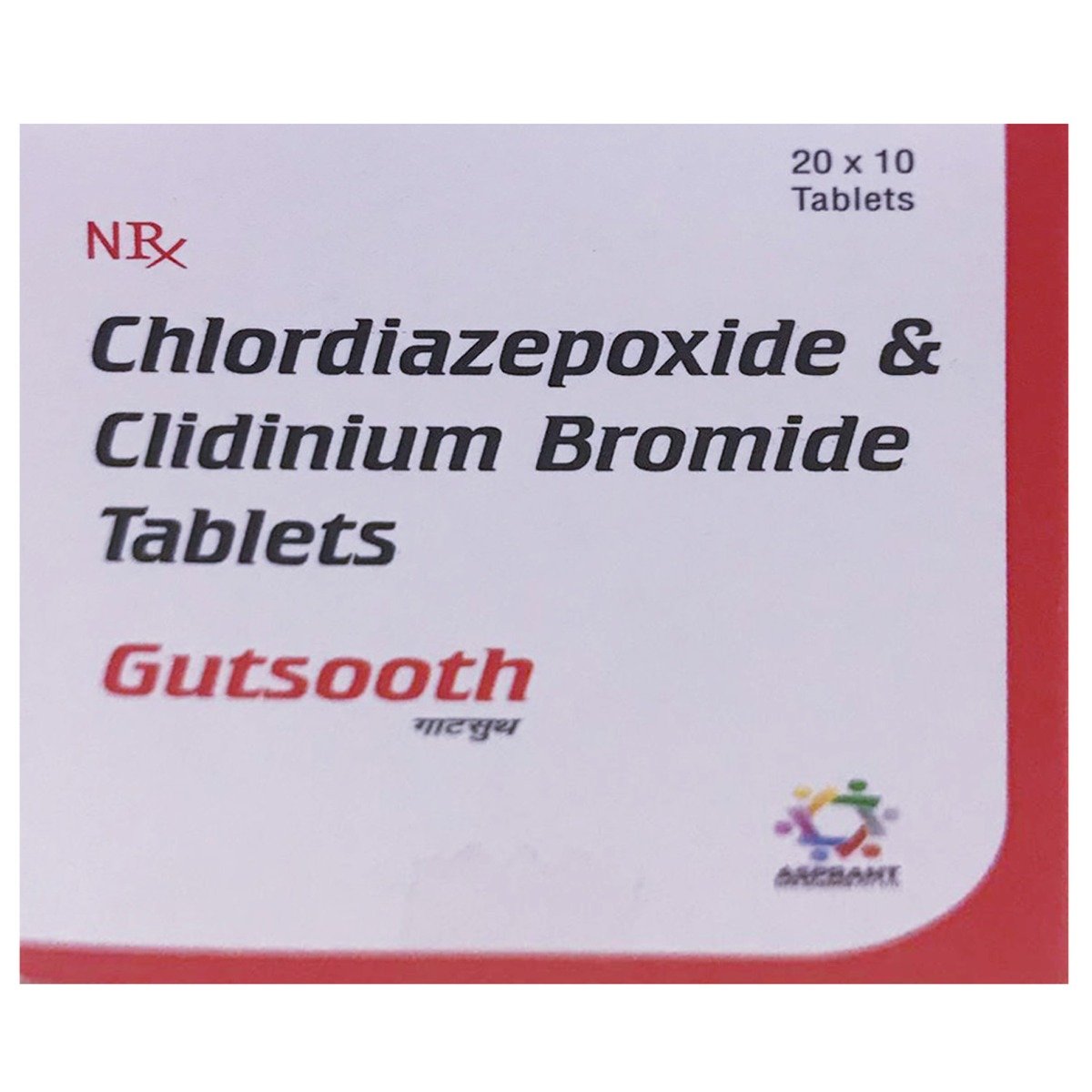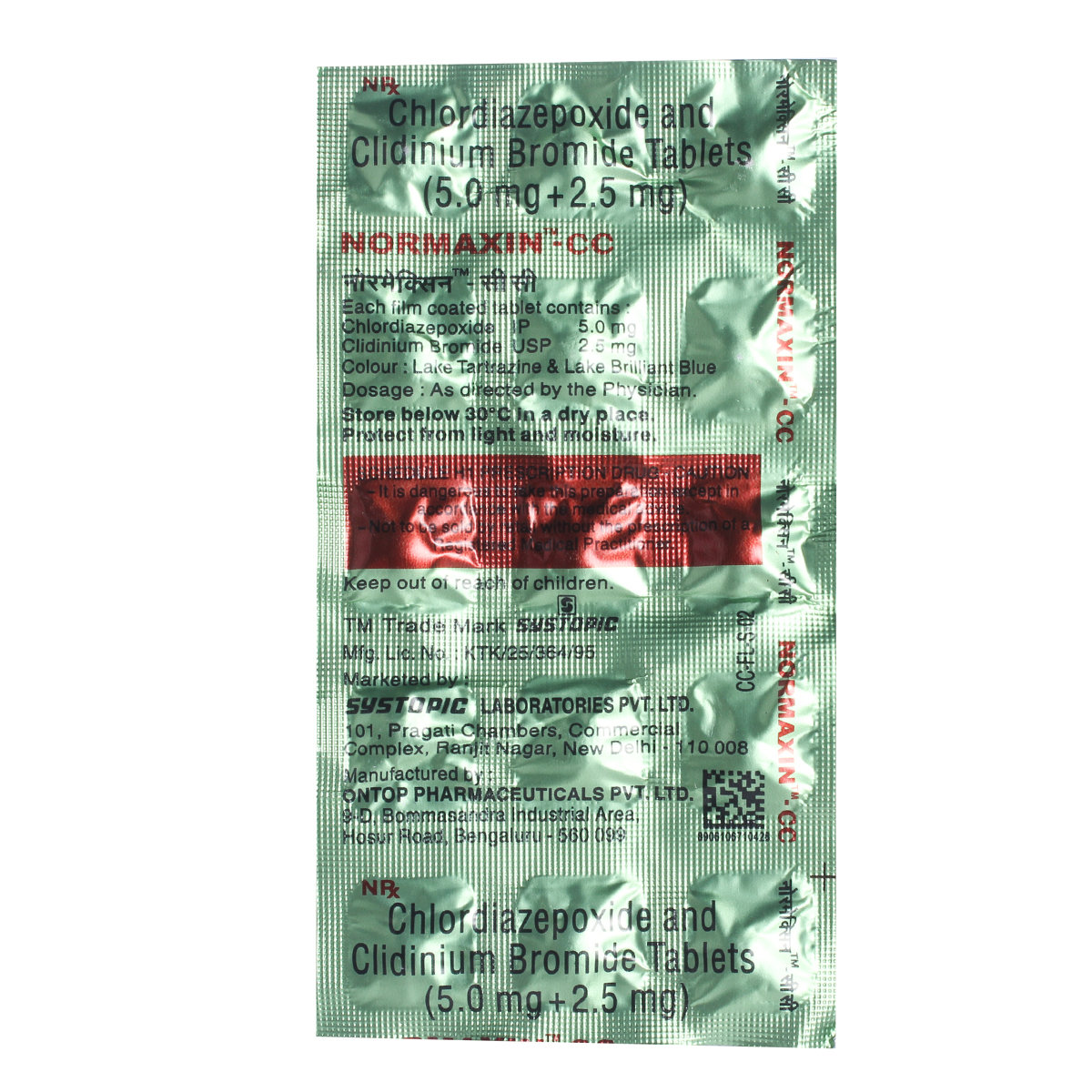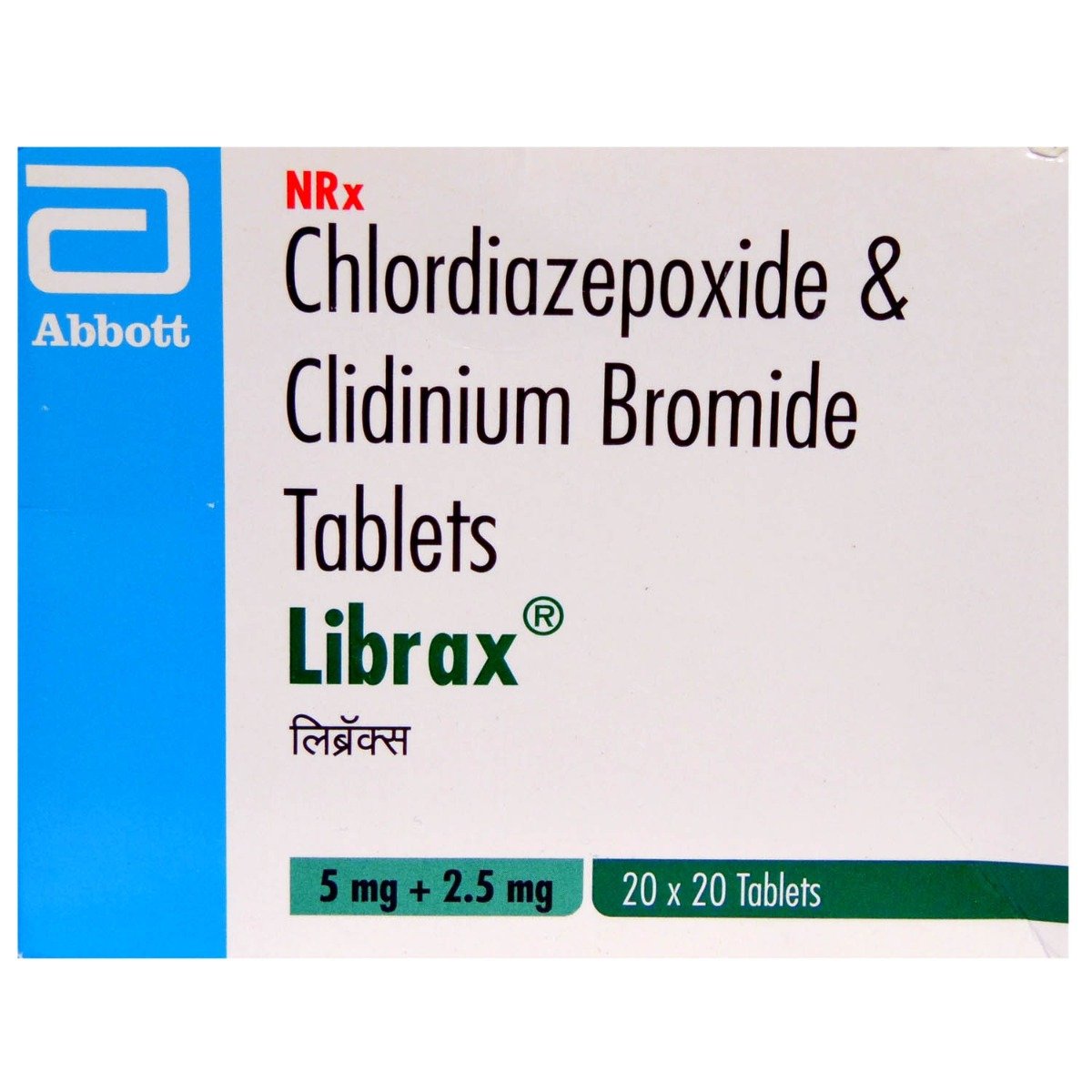Gutsooth Tablet 10's
MRP ₹75
(Inclusive of all Taxes)
₹11.3 Cashback (15%)
Provide Delivery Location
Online payment accepted
 Prescription drug
Prescription drugWhats That
Composition :
Manufacturer/Marketer :
Consume Type :
Expires on or after :
Return Policy :
About Gutsooth Tablet
Gutsooth Tablet belongs to a class of medications called ‘gastrointestinal agents’ used in the treatment of peptic ulcers, irritable bowel syndrome (IBS), and enterocolitis (swelling in the intestine). Peptic ulcers are sores that develop on the stomach and intestine lining due to erosion of the stomach's protective lining. An irritable bowel syndrome is a group of intestinal symptoms that occur together. Enterocolitis is an inflammation of the digestive tract caused by bacteria, viruses, parasites, fungus, or other causes.
Gutsooth Tablet is a combination of two medicines: Chlordiazepoxide and Clidinium. Chlordiazepoxide is a benzodiazepine that decreases abnormal activity in the brain. It interferes with the chemical messenger's activity that passes messages to the brain cells, providing a calming effect and relaxing muscles. Clidinium is an anticholinergic that acts by decreasing stomach acid production. It helps to provide relief from stomach spasms and cramps.
Gutsooth Tablet is available in the form of capsules. You should take this medicine as prescribed by your doctor. Gutsooth Tablet may cause side-effects such as dry mouth, blurred vision, constipation, nausea, bloating, urination problems, drowsiness, dizziness, rash, swelling, irregular menstrual periods, and increased or decreased libido (sexual desire). Inform your doctor if any of these side-effects persist or get worsen.
Do not take Gutsooth Tablet if you are allergic to Chlordiazepoxide, Clidinium, or any other ingredients present in it. Before taking Gutsooth Tablet , inform your doctor if you have glaucoma (increased pressure inside the eye), enlarged prostate, difficulty urinating, heart problems, liver, or kidney diseases, depression, alcohol abuse, and high blood pressure. Gutsooth Tablet is not recommended for use in children. Also, inform your doctor if you are pregnant, planning to become pregnant, or breastfeeding.
Uses of Gutsooth Tablet
Directions for Use
Key Benefits
Gutsooth Tablet is a combination of two medicines: Chlordiazepoxide and Clidinium. Chlordiazepoxide is a benzodiazepine that decreases abnormal activity in the brain. It interferes with the chemical messenger's activity that passes messages to the brain cells, providing a calming effect. It can also reduce anxiety related to gastrointestinal disorders. Clidinium is an anticholinergic that acts by decreasing stomach acid production. It helps to provide relief from stomach spasms and cramps. Together, Gutsooth Tablet can be effectively used to treat gastrointestinal disorders such as peptic ulcers, irritable bowel syndrome (IBS), and enterocolitis (swelling in the intestine).
Storage
- Avoid driving or operating machinery or activities that require high focus until you know how the medication affects you.
- Maintain a fixed sleeping schedule, create a relaxing bedtime routine and ensure your sleeping space is comfortable to maximize your sleep quality.
- Limit alcohol and caffeine as these may worsen drowsiness and disturb sleep patterns.
- Drink plenty of water as it helps with alertness and keeps you hydrated and for overall well-being.
- Moderate physical activity can improve energy levels, but avoid intense workouts right before bedtime.
- Inform your doctor about dizziness symptoms. They may adjust your medication regimen or prescribe additional medications to manage symptoms.
- Follow your doctor's instructions for taking medication, and take it at the same time every day to minimize dizziness.
- When standing up, do so slowly and carefully to avoid sudden dizziness.
- Avoid making sudden movements, such as turning or bending quickly, which can exacerbate dizziness.
- Drink plenty of water throughout the day to stay hydrated and help alleviate dizziness symptoms.
- If you're feeling dizzy, sit or lie down and rest until the dizziness passes.
- Track when dizziness occurs and any factors that may trigger it, and share this information with your doctor to help manage symptoms.
- Avoid driving or operating machinery or activities that require high focus until you know how the medication affects you.
- Maintain a fixed sleeping schedule, create a relaxing bedtime routine and ensure your sleeping space is comfortable to maximize your sleep quality.
- Limit alcohol and caffeine as these may worsen drowsiness and disturb sleep patterns.
- Drink plenty of water as it helps with alertness and keeps you hydrated and for overall well-being.
- Moderate physical activity can improve energy levels, but avoid intense workouts right before bedtime.
- Uncoordinated muscle movements need immediate medical attention.
- Observe your movements and try to understand and control the particular movement.
- Regularly do strengthening exercises to improve blood flow throughout the body and avoid involuntary movements.
- Implement massage techniques to enhance blood flow to organs.
- Take a balanced diet and quit smoking.
- Practice yoga and meditation to improve thought processes and reduce uncontrolled and involuntary movements.
- Confusion is a major psychotic disorder that needs immediate medical attention.
- Acknowledge your experience and put effort to control confusion.
- Avoid smoking and alcohol intake as it can worsen the condition and increase your confusion.
- Practice meditation and yoga to avoid anxiety, which can be one of the leading causes.
- Talk to your dietician and consume food that can improve your mental health.
- Rest well; get enough sleep.
- Eat a balanced diet and drink enough water.
- Manage stress with yoga and meditation.
- Limit alcohol and caffeine.
- Physical activities like walking or jogging might help boost energy and make you feel less tired.
Drug Warnings
Gutsooth Tablet should be used with caution in patients with drug abuse or addiction, vision problems, or urination problems. Do not take sedatives, pain killers, cough medicines, or other medicines that cause drowsiness along with Gutsooth Tablet as it may cause fatal side-effects. Do not stop Gutsooth Tablet abruptly as it may cause withdrawal symptoms such as fits, tremors, muscle cramps, stomach cramps, depression, vomiting, sleeping problems, and sweating.
Drug-Drug Interactions
Drug-Drug Interactions
Login/Sign Up
Taking Gutsooth Tablet with Sodium oxybate increases the risk of breathing difficulty or low blood pressure.
How to manage the interaction:
Taking Gutsooth Tablet with Sodium oxybate is generally avoided as it can lead to an interaction, it can be taken if prescribed by a doctor. However, if you experience dizziness, shortness of breath, excessive sweating, or blurred vision, contact your doctor. Do not discontinue any medications without consulting a doctor.
Taking Potassium chloride with Gutsooth Tablet may increase the risk of irritant effects of potassium on your stomach and upper intestine.
How to manage the interaction:
Co-administration of Potassium chloride with Gutsooth Tablet is not recommended, it can be taken if prescribed by the doctor. However, if you experience symptoms such as severe stomach pain, bloating, sudden dizziness or lightheadedness, nausea, vomiting (especially with blood), decreased hunger, black, tarry stools, consult the doctor immediately. Do not discontinue any medications without consulting a doctor.
Taking Potassium citrate with Gutsooth Tablet may increase the irritant effects of potassium on stomach and upper intestine. This interaction is applicable only in tablet or capsule form of Potassium citrate.
How to manage the interaction:
Co-administration of Potassium citrate(tablet or capsule form) with Gutsooth Tablet is not recommended as it can lead to an interaction, it can be taken if prescribed by the doctor. However, if you experience stomach pain, bloating, sudden dizziness or lightheadedness, nausea, vomiting (especially with blood), decreased hunger, black, tarry stools, consult the doctor immediately. Do not discontinue any medications without a doctor's advice.
Co-administration of butorphanol with Gutsooth Tablet can increase the risk of side effects like decreased breathing rate, irregular heart rhythms, or problems with movement and memory.
How to manage the interaction:
Taking butorphanol and Gutsooth Tablet together can result in an interaction, it can be taken if your doctor has advised it. However, if you experience drowsiness, shortness of breath, palpitations, numbness in hands and feet, or hypersensitivity to light and noise, consult a doctor immediately. Do not discontinue any medications without consulting a doctor.
Co-administration of droperidol with Gutsooth Tablet may significantly lead to low blood pressure irregular heart rhythm.
How to manage the interaction:
Taking droperidol and Gutsooth Tablet together can result in an interaction, it can be taken if your doctor has advised it. However, if you experience any symptoms such as slow heart rate, low blood pressure, lightheadedness, fainting, irregular heartbeat, drowsiness, or difficulty concentrating, consult a doctor immediately. Do not discontinue any medications without consulting a doctor.
Co-administration of oxycodone with Gutsooth Tablet can increase the risk of side effects like decreased breathing rate, irregular heart rhythms, or problems with movement and memory.
How to manage the interaction:
Taking oxycodone and Gutsooth Tablet together can result in an interaction, it can be taken if your doctor has advised it. However, if you experience any symptoms such as dizziness, shortness of breath, numbness in hands and feet, or palpitations, consult a doctor immediately. Do not discontinue any medications without consulting a doctor.
Co-administration of fentanyl with Gutsooth Tablet can increase the risk of side effects like decreased breathing rate, irregular heart rhythms, or problems with movement and memory.
How to manage the interaction:
Taking fentanyl and Gutsooth Tablet together can result in an interaction, but it can be taken if your doctor has advised it. However, consult a doctor immediately if you experience symptoms such as breathing difficulty, numbness in hands and feet, or headache. Do not discontinue any medications without consulting a doctor.
Co-administration of nalbuphine with Gutsooth Tablet can increase the risk or severity of side effects like decreased breathing rate, irregular heart rhythms, or problems with movement and memory.
How to manage the interaction:
Taking nalbuphine and Gutsooth Tablet together can result in an interaction, but it can be taken if your doctor has advised it. However, if you experience any symptoms such as dizziness, shortness of breath, numbness in hands and feet, or palpitations consult a doctor immediately. Do not discontinue any medications without consulting a doctor.
Co-administration of Gutsooth Tablet with clozapine can increase the side effects.
How to manage the interaction:
Taking clozapine and Gutsooth Tablet together can result in an interaction, it can be taken if your doctor has advised it. However, if you experience any symptoms such as drowsiness, confusion, breathing difficulty, palpitations, and incoordination. Do not discontinue any medications without consulting a doctor.
Co-administration of ketamine with Gutsooth Tablet may significantly increase the side effects of Gutsooth Tablet.
How to manage the interaction:
Taking ketamine and Gutsooth Tablet together can result in an interaction, it can be taken if your doctor has advised it. However, if you experience any symptoms such as dizziness, drowsiness, shortness of breath, or palpitations, consult a doctor immediately. Do not discontinue any medications without consulting a doctor.
Drug-Food Interactions
Drug-Food Interactions
Login/Sign Up
Diet & Lifestyle Advise
- Eat smaller meals more often.
- Avoid smoking and alcohol consumption.
- Maintain a healthy weight by regular exercising.
- Avoid carbonated and caffeinated beverages.
- Practice relaxation techniques and avoid stress by doing yoga or meditation.
- Avoid foods such as high-fat food, spicy food, chocolates, citrus fruits, pineapple, tomato, onion, garlic, tea, and soda.
- Avoid deep-fried and spicy foods.
- Take foods containing probiotics as they may help in providing relief from gas and bloating.
Side Effects of Gutsooth Tablet
- Dry mouth
- Blurred vision
- Constipation
- Nausea
- Bloating
- Urination problems
- Drowsiness
- Dizziness
- Rash
- Swelling
- Irregular menstrual periods
- Increased or decreased libido (sexual desire)
Habit Forming
Therapeutic Class
All Substitutes & Brand Comparisons
RX
Not for online saleNormaxin-CC Tablet 15's
Systopic Laboratories Pvt Ltd
₹32
(₹1.92 per unit)
71% CHEAPERRX
Out of StockNot for online saleColiwin Tablet 10's
Magnet Labs Pvt Ltd
₹43
(₹3.87 per unit)
42% CHEAPERRX
Not for online saleRibs Tablet 10's
Zoic Life Sciences
₹46.5
(₹4.19 per unit)
37% CHEAPER
Drug-Diseases Interactions
Drug-Diseases Interactions
Login/Sign Up
FAQs
Drug-Drug Interactions Checker List
- WARFARIN
- CHLORPROMAZINE
- FLUPHENAZINE
- THIORIDAZINE
- ISOCARBOXAZID
- LINEZOLID
- METHYLENE BLUE
- PHENELZINE
- SELEGILINE
- TRANYLCYPROMINE
Special Advise
- Do not stop taking Gutsooth Tablet on your own, as it may cause withdrawal symptoms.
- Gutsooth Tablet should be used with caution, and regular monitoring is advised in patients with glaucoma and benign prosthetic hyperplasia (BPH).
Disease/Condition Glossary
Peptic ulcers: Peptic ulcers are sores that develop on the stomach and intestine lining due to erosion of the stomach protective lining. Symptoms include nausea, changes in appetite, bloody or dark stools, unexplained weight loss, vomiting, and indigestion.
Irritable bowel syndrome (IBS): It is a common disease that affects the large intestine. IBS is also known as irritable colon, spastic colon, spastic colitis, and mucous colitis. An irritable bowel syndrome is a group of intestinal symptoms that occur together. The exact cause is unknown, but common causes of IBS are acidity, stress, carbonated foods and beverages, irregular hormone levels, certain food, and medications. Symptoms include abdominal pain, cramps, bloating, gas, constipation, and diarrhea.
Enterocolitis: It is an inflammation of the digestive tract caused by bacteria, viruses, parasites, fungus, or other causes. Symptoms include loss of appetite, nausea, vomiting, abdominal pain, mucus-like discharge from the rectum, and diarrhea.

Have a query?
Alcohol
Safe if prescribed
Avoid alcohol intake as alcohol may increase drowsiness and also worsens the health condition.
Pregnancy
Consult your doctor
Gutsooth Tablet is a category D drug. It should not be used in pregnant women as it may cause birth defects to the unborn baby.
Breast Feeding
Consult your doctor
Gutsooth Tablet may decrease the production of breast milk. So, it should be used with caution in breastfeeding mothers.
Driving
Safe if prescribed
Gutsooth Tablet may cause drowsiness, so refrain from activities such as driving or operating heavy machinery.
Liver
Consult your doctor
Gutsooth Tablet should be used with caution in patients with liver diseases. The dose may have to be adjusted by your doctor.
Kidney
Consult your doctor
Gutsooth Tablet should be used with caution in patients with kidney diseases. The dose may have to be adjusted by your doctor.
Children
Safe if prescribed
Gutsooth Tablet is not recommended for use in children under 12 years of age.











